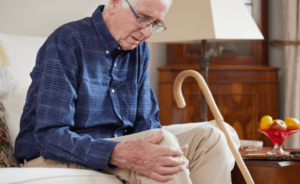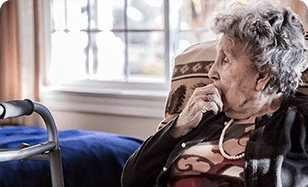About Nursing Home Injuries
Nursing home abuse injuries occur when a resident of a care facility is physically harmed.

Various factors can contribute to nursing home injuries. Some might be accidental due to decreased mobility or physical capability often associated with aging or declining health.
Some injuries, however, are the result of nursing home abuse or neglect, usually by staff members or health care providers.
If negligence is involved, you may be able to take legal action for nursing home abuse injuries. Seeking assistance through a lawsuit can lead to financial compensation for medical care for nursing home injuries. You may even be able to move your loved one to a safer facility.
Our legal partners have secured over $256 million for families affected by nursing home injuries and other types of abuse or neglect in care facilities.
Find out if you can take legal action for nursing home abuse injuries right now with a free case review.
What Causes Nursing Home Abuse Injuries?
There are many potential causes of nursing home abuse and neglect that lead to injury. Many are related to staffing levels and training in long-term care facilities and other assisted living facilities.
Potential causes for nursing home abuse injuries include:
- Inadequate staff training and education
- Insufficient staff screening and background checks
- Issues specific to individual caregivers or workers
- Overall mismanagement of the facility
- Overworked or underpaid staff
- Poor supervision throughout the facility
- Staffing shortages
- Underfunded facilities resulting in poor quality of care
Even if none of these factors exist, nursing home abuse injuries can still happen. That’s why knowing the warning signs of abuse is so important.
If a nursing home injury is unexplainable or seems odd, it may be cause for concern and should be looked into. This is especially true if the resident has a condition, like dementia, that makes it hard for them to speak up or advocate for themselves.
An experienced nursing home abuse law firm can help family members investigate the cause of their loved one’s nursing home abuse injuries and take legal action on their behalf if they have a case.
Types of Nursing Home Abuse Injuries
There are several common types of nursing home injuries from abuse and neglect. Here are some of the most reported.
Bedsores (Pressure Ulcers)
Bedsores, also known as pressure sores or pressure ulcers, occur when a person remains in the same position for too long without being moved or adjusted. If left untreated, bedsores can result in serious complications and even death.
“The most serious (stages 3 and 4) increase your risk of life-threatening infections.”
—Cleveland Clinic
Since bedsores are almost always preventable, nursing home abuse is to blame for not repositioning the patient frequently or not treating bedsores promptly.
If your loved one developed severe bedsores, you may be able to take legal action. Connect with us right now.

Our case managers can answer your questions and connect you to an attorney.
Chat NowBroken Bones
Preventable injuries that cause broken bones can occur in several different ways, including a fall in an area that was kept cluttered or unsafe, which could be considered nursing home neglect.
They may also arise from nursing home falls that could have been avoided, with hip fractures among the most common nursing home injuries.
Dehydration and Malnutrition
Dehydration and malnutrition can occur when a resident is denied adequate food and water, leading to serious complications like severe weight loss and even death.
Additionally, they can make frail residents weak and confused and more likely to have accidents and other nursing home injuries.
Falls
Nursing home injuries from falls can be the result of abuse, such as if a staff member pushes or shoves a resident. They can also result from negligence, such as when an area has poor lighting or a pathway is cluttered with objects.
Regardless of the reason, nursing home falls can be deadly.
You may have a nursing home fall lawsuit if the resident was injured and the fall could have been avoided. Falls in nursing homes are common, but it is the duty of staff to prevent them whenever possible. Get a free case review now to see if you can sue for a nursing home fall.
Types of nursing home injuries due to falls include:
- Broken bones
- Bruises and cuts
- Concussions and other head injuries
- Hip fractures
- Spine and back injuries
- Sprains
- Traumatic brain injuries (TBIs)
Infections
Infections can quickly happen with nursing home neglect, especially if wounds or sores aren’t adequately treated.
Preventing infection spread is crucial. For instance, many nursing homes faced high death rates during the initial COVID-19 wave due to neglect.
Additionally, infections can spread if staff lack proper medical training or use unsterilized equipment carrying bacteria.
Some infections like sepsis are life-threatening, potentially leading to severe complications like gangrene and amputations.
Examples of common infections that may occur in nursing homes include:
- Clostridium Difficile (C. difficile)
- Influenza (flu)
- Methicillin-resistant Staphylococcus aureus (MRSA)
- Pneumonia
- Scabies
- Staph
- Urinary tract infections (UTIs)
Injuries Caused by Bed Rails
Bed rails are typically used to prevent residents from falling out of bed. However, they can also present hazards.
Nursing home injuries from bed rails are usually the result of neglect. This can happen if staff overlook a resident being suffocated, cut, or asphyxiated by their bed rail or fail to engage the bed rail, leading to a fall.
Medication Mistakes
Medication errors occur when a nursing home resident is given too much or too little of their prescribed medication or the wrong one.
Other medication mistakes might not be immediately noticeable. These include not providing enough food or water with medication, not shaking a medication when required, or giving medicines in a form different from what was prescribed. Any of these situations can result in the medication not working as intended.
Spinal Injuries
Spinal injuries in nursing homes can arise from abusive actions, such as a staff member pushing a resident onto the floor or intentionally dropping them during transport.
These types of nursing home abuse injuries can also result from neglect, like when a staff member withholds mobility assistance, making a resident with disabilities
attempt to move on their own.
What Are the Signs of Nursing Home Abuse?
The signs of nursing home abuse may not always be clear or evident on the outside, especially if your loved one has a condition that makes it difficult to communicate.
Because of this, knowing the signs of nursing home abuse is essential, so you can step in and take action before things get worse.
Signs of nursing home abuse include:
- General decline in well-being
- Infections that recur or never heal
- Loss of interest in previously enjoyed activities
- Marks on arms or legs suggesting restraint
- Persistent or recurrent depression or anxiety
- Torn or blood-stained clothing
- Unexplained injuries like bruises or cuts
- Withdrawal or isolation from loved ones
If your loved one is showing signs of nursing home abuse, you may have legal options to hold the negligent facility accountable.
Get a free case review now to find out if LawFirm.com can help you take legal action for nursing home abuse injuries.
Effects of Nursing Home Abuse Injuries
The effects of nursing home abuse are not just short-term but can also have severe long-term consequences if left untreated.
Effects of nursing home abuse injuries include:
- Bedsores can lead to dangerous stage 4 bedsores, which can be deep enough to reach a person’s bones and even lead to death.
- Broken bones may not heal correctly, leading to permanent disability. They can also lead to life-threatening bone infections.
- Infections can turn into serious blood infections like sepsis, with a mortality rate of between 20% and 36%.
- Medication mistakes can lead to life-threatening emergency situations and cause new conditions to develop or existing conditions to worsen.
- Spinal injuries can lead to permanent disability or paralysis.
Steps to Preventing Nursing Home Abuse Injuries
Here are some steps to prevent nursing home abuse injuries from happening to your loved one in a care home.
1. Check on Your Loved One Often
It’s important to regularly check on your loved one in a nursing home through phone calls and in-person visits when possible.
In addition to asking them questions about their experience, visiting them in person can give you a better idea of the facility’s condition and the staff’s quality.
2. Know the Signs of Nursing Home Abuse
When speaking with or visiting your loved one, look for signs of nursing home abuse.
This means knowing the right questions to ask your loved one to get a better feel for how they are being treated.
Examples of questions to ask your loved one include:
- Is everything okay here?
- Do you feel safe and comfortable?
- Is there anything you’d like to talk about regarding living here?
3. Report Nursing Home Abuse Injuries Right Away
Whenever you suspect abuse by a caregiver or within a nursing home, it’s crucial to report this information immediately.
Timely reporting of nursing home abuse can help ensure the individual is moved to a safe environment away from their abuser and holds all responsible parties accountable.
You have several options for reporting nursing home abuse injuries:
- Alert the nursing home directly
- Contact your state’s long-term care ombudsman
- Connect with an experienced nursing home abuse lawyer
- Get in touch with a social worker who can assist in the process
- Reach out to Adult Protective Services
- Report the incident to local law enforcement
4. Seek Justice Through a Lawsuit
Depending on the extent of your loved one’s nursing home abuse injuries, you may consider taking legal action to get justice and financial compensation.
A nursing home settlement from a successful lawsuit can help cover medical expenses and compensate for damages such as pain and suffering and the loss of enjoyment of life.
What Laws Protect Older Adults from Nursing Home Abuse?
Regardless of age or other characteristics, everyone deserves fair and dignified treatment. The following laws are in place specifically to protect older Americans from discrimination and mistreatment.
Laws that protect older adults from nursing home abuse and neglect include:
- Elder Justice Act: Enacted in 2010, this law funds elder abuse prevention and mandates reporting by nursing home staff.
- No-Fear Act: Protects whistleblowers from workplace retaliation, encouraging reporting of abuse by staff.
- The Older Americans Act: Established in 1965, reauthorized in 2016, allocates funds for elder abuse prevention.
- Violence Against Women Act: Offers programs for female victims of elder abuse, in addition to addressing domestic violence.
When these laws are ignored and cause nursing home abuse injuries, you may be able to file a nursing home abuse lawsuit.
Legal Help for Nursing Home Abuse Injuries
If you or a loved one has suffered nursing home abuse injuries, LawFirm.com is here to support you. No one should ever be harmed by those hired and entrusted to care for them and make them feel safe and comfortable.
We understand the challenges and distress that nursing home abuse injuries bring. Having a dedicated attorney by your side to hold negligent parties accountable is your best defense.
Our legal partners have helped recover over $256 million for families who have suffered from nursing home abuse or neglect. Find out if they can help you, too.
Call (888) 726-9160 for a free consultation or fill out this form for a free case review right now to see if we can connect you with a top-quality nursing home abuse attorney or law firm in your area.
Nursing Home Abuse Injuries FAQs
What type of abuse is most common in nursing homes?
Abuse in nursing homes can take several forms, including physical abuse, emotional or psychological abuse, sexual abuse, financial exploitation, and neglect.
Among these, neglect and psychological abuse are reported to be the most common.
What are the most common causes of falls in nursing homes?
Falls in nursing homes are often caused by a combination of factors. These factors include resident health conditions, medications that may affect balance, and the nursing home environment.
Environmental factors such as debris in walking areas, poor lighting, wet floors, and inadequate handrails can significantly contribute to the risk of falls.
It’s essential to address both resident-specific and environmental factors to prevent falls that could lead to nursing home injuries and ensure the safety of your loved one.
What is the most common injury that occurs when a resident falls?
Falls are unfortunately common in nursing homes and can result in various injuries. The most common injury when a resident falls in a nursing home is a fracture, particularly a hip fracture.
Fractures and broken bones from falls are not only painful but can also lead to complications in already frail residents.
If your loved one was injured after a nursing home fall, make sure they get immediate medical attention. If you think their injury should have been prevented, consider speaking with an attorney. Get a free case review now to see if we can help.
 Get Legal Help Now
Get Legal Help Now
